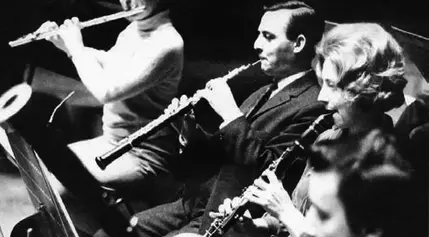Amelia Freedman, an enduring force in British music, has left an indelible mark on the cultural landscape. For six decades, she has championed chamber music through her leadership of the Nash Ensemble and the Bath Mozartfest, nurturing a legacy that transcends generations. Her contributions have not only preserved classical traditions but also embraced innovation, ensuring that the future of music remains vibrant and dynamic.A Pillar of British Music, Shaping Generations of Musicians and Audiences Alike
Forging a Lasting Musical Institution
In 1964, when Harold Wilson became prime minister, Amelia Freedman, then a Royal Academy of Music student, embarked on a journey that would redefine British chamber music. She founded the Nash Ensemble, named after Georgian architect John Nash, defying skepticism about the longevity of ensembles. Over six decades, this group has become the benchmark for excellence, performing at venues like the Wigmore Hall and showcasing both revered classics and lesser-known compositions.The ensemble's commitment to innovation is evident in its diverse repertoire. At its sixtieth-anniversary celebration, the Nash Ensemble presented a program that included works by Clara and Robert Schumann and Felix Mendelssohn. The performance was dedicated to Freedman’s late husband, Michael Miller, reflecting the personal and artistic connections that underpin the ensemble's success.
Celebrating Milestones with Passion and Precision
Each November, the Nash Ensemble participates in the Bath Mozartfest, a festival that has flourished under Freedman's direction for three decades. During one memorable concert, the ensemble performed Beethoven's E flat Septet alongside Benjamin Britten’s Divertimenti—a piece often overlooked but rich with potential. The musicians breathed new life into these compositions, particularly the Clarinet Quintet by Mozart, which was performed as if it had just been composed.The viola player, Lars Anders Tomter, delivered a standout performance in the "March" section of Britten’s Divertimenti, introducing vivid themes with fanfare triplets. Meanwhile, clarinetist Richard Hosford treated the audience to a fresh interpretation of the Mozart Clarinet Quintet, engaging intimately with the string players. These performances exemplify the ensemble's ability to make even the most familiar pieces feel innovative.
The Art of Chamber Music: Intimacy and Innovation
Chamber music occupies a unique space between solo and orchestral performances. With fewer than a dozen players, ensembles like the Nash can explore some of the finest compositions ever written, from Mozart’s Gran Partita to Mendelssohn’s Octet. Freedman’s vision has ensured that the Nash Ensemble remains at the forefront of this genre, offering performances that are both technically brilliant and emotionally resonant.One of the Nash Ensemble’s hallmarks is its annual themed concerts, such as “The French Connection” and “From My Homeland,” which delve into specific musical traditions. Perhaps the most poignant series was “Theresienstadt-Terezín 1941–45,” commemorating the concentration camp where Jewish musicians continued to create art despite unimaginable adversity. This series highlighted the resilience of the human spirit and the enduring power of music.
Promoting New Voices in Classical Music
Under Freedman’s leadership, the Nash Ensemble has not only preserved the past but also embraced the future. They have commissioned and premiered hundreds of new works by over 200 composers, including Michael Nyman and Sir Harrison Birtwistle. This commitment to contemporary music ensures that the ensemble remains relevant and forward-thinking.Freedman’s dedication to nurturing new talent is exemplified by her collaborations with emerging composers. The ensemble’s first season featured works by Nyman and Simon Harris, and they have since premiered pieces by renowned figures like Judith Weir. Freedman’s approach emphasizes close study, intensive rehearsal, and technical virtuosity, resulting in performances that are both lyrical and deeply engaging.
A Life Devoted to Music
Amelia Freedman’s influence extends beyond her work with the Nash Ensemble. Born and raised in London, she has been a driving force in British musical life for over half a century. Her career has taken her to various institutions, including the Israel Festival and the Philharmonia Orchestra. Despite challenges, Freedman has remained committed to her passion, even stepping away from teaching to focus on running the Nash Ensemble.Her leadership of the Bath Mozartfest since 1995 has further solidified her legacy. Held in two iconic venues—the Assembly Rooms and the Guildhall—the festival showcases a wide range of musical styles. Even in her absence due to illness, Freedman’s impact is felt through the caliber of performers and the richness of programming. Notable performances include Angela Hewitt’s piano concertos, Sarah Connolly’s vocal renditions, and Sir András Schiff’s mesmerizing recitals.
Continuing the Tradition of Excellence
As the Nash Ensemble celebrates its illustrious history, its influence continues to grow. In December, Radio 3 dedicated a week to the ensemble, broadcasting recordings from Bath and other venues. Highlights included Brahms’s Horn Trio and Kurt Schwertsik’s world premiere, “Last Days in Old Europe.” These broadcasts offer a glimpse into the ensemble’s versatility and the depth of Freedman’s artistic vision.Amelia Freedman’s contributions to British music are immeasurable. Through her leadership of the Nash Ensemble and the Bath Mozartfest, she has fostered a culture of innovation and excellence. Her legacy will undoubtedly inspire future generations of musicians and audiences alike.

